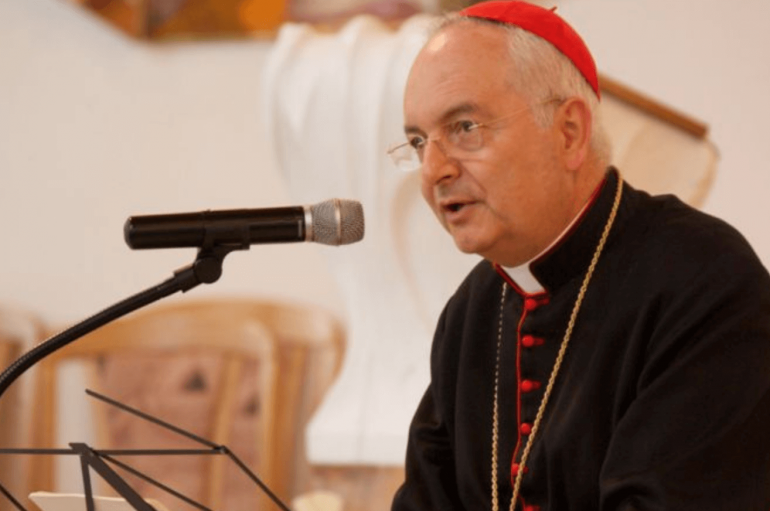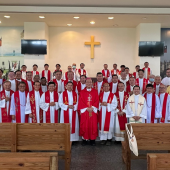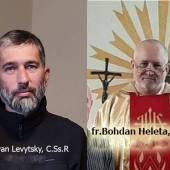As Christmas approaches, priests should emphasize that confession can heal, cardinal says

Sacramental confession has healing abilities that priests should especially emphasize to help bring God’s love and consolation to a world damaged by two years of the coronavirus pandemic. That is the advice for confessors from Cardinal Mauro Piacenza, who stressed the urgency of their work for humanity.
“In the season of Advent, every confessor is called to look to, and, with supernatural grace, in a certain way to identify with John the Baptist, repeating to the world: ‘Behold the Lamb of God’,” said Piacenza, the Major Penitentiary of the Apostolic Penitentiary.
His office is a tribunal of the Apostolic See which has jurisdiction over indulgences and the absolution of the gravest sins.
In a message to confessors for Christmas 2021, the cardinal said the approach of Christmas is a time to “further emphasize those aspects of healing” of the Sacrament of Reconciliation.
“The confessor, with the humble and faithful exercise of his ministry, shows to the world that the Lord is present: he is present as a merciful embrace, as love and justice, as truth and grace, as consolation and tenderness,” Piacenza continued. “In the disorientation of our time, which generates existential loneliness that at times is dramatic, it becomes urgent and necessary to show, with luminous clarity, the presence of the Lord in the world alongside men, the presence of the Lord as the only Savior.”
The prolonged period of the pandemic means that even more confessors will have to exercise “the ministry of consolation,” itself another name for mercy. At the same time, they must make themselves available for confession, the cardinal said.
“Our being present and available will encourage the faithful who want to approach reconciliation or who, upon seeing us, receive from us some supernatural insight,” he continued. “Someone takes action and converts only for a presence, never for an absence!”
The faithful can also draw spiritual support from the Virgin Mary, he alluded: “The light of the Immaculate Conception, on the path that leads to Holy Christmas, is reflected and renews the fruitfulness of the Advent journey and reassures hearts in a time that is certainly not easy for the life of all men.”
The Christian faith does not proclaim a god who is “alien” or “distant” from human affairs, Piacenza said. Rather, “God has chosen to reveal himself, to enter history, to become a participant in the human story, to save us from within this story itself.” God does this “by remaining in time, through the mystery of the Church and of her identity and sacramental action.”
The “saving uniqueness of Christ” makes salvation possible and real, he said: “if Jesus of Nazareth were not the only one Savior, there simply would be no salvation.”
“The ministry of reconciliation is called to proclaim this salvific uniqueness, in circumstances in which the ‘disorienting cries’ multiply and, paradoxically… the thirst for truth and justice, the thirst for real freedom and liberation, grows in men,” the cardinal continued.
The confessor must help reveal “ the presence of the Lamb of God in the world.” The confessor-priest, through the sacrament of Holy Orders, is also called to identify with this presence. Through the power of Jesus Christ to forgive sins, each confessor extends “the very mission of Jesus: to reconcile men in God, in justice and in truth, which in God the Father is called Mercy.”
“What mission can you imagine is more necessary and urgent for humanity?” the cardinal asked. “If the evil of the world is always in a certain way linked to sin, what can be done that is more useful and necessary than to ‘free from the evil’ done, through the ministry of reconciliation?”
“In the hidden exercise of this precious ministry, ignored and even attacked by a world so secularized that it no longer understands its own nature and essential needs, the confessor knows well that he is participating in the only authentic revolution: that of mercy and goodness, of truth, and of justice. The ‘revolution of love’ inaugurated by Jesus Christ who revealed to us that God himself is Love,” Piacenza continued.
“Outside of a clear Christ-centered perspective, every saving promise is a utopia, a functional distraction from power and a lie that comes from the deceiver,” he said. “Only personal conversion to Christ builds the Church and the world.”
The cardinal voiced his “deepest gratitude” for all confessors and for the Penitentiaries of the Papal Basilica, citing their “mystical and supernatural service to Christ and to the Church, to souls and to society as a whole.” He entrusted them to the Virgin Mary and wished them a holy Christmas.
Radio Veritas Asia (RVA), a media platform of the Catholic Church, aims to share Christ. RVA started in 1969 as a continental Catholic radio station to serve Asian countries in their respective local language, thus earning the tag “the Voice of Asian Christianity.” Responding to the emerging context, RVA embraced media platforms to connect with the global Asian audience via its 21 language websites and various social media platforms.














